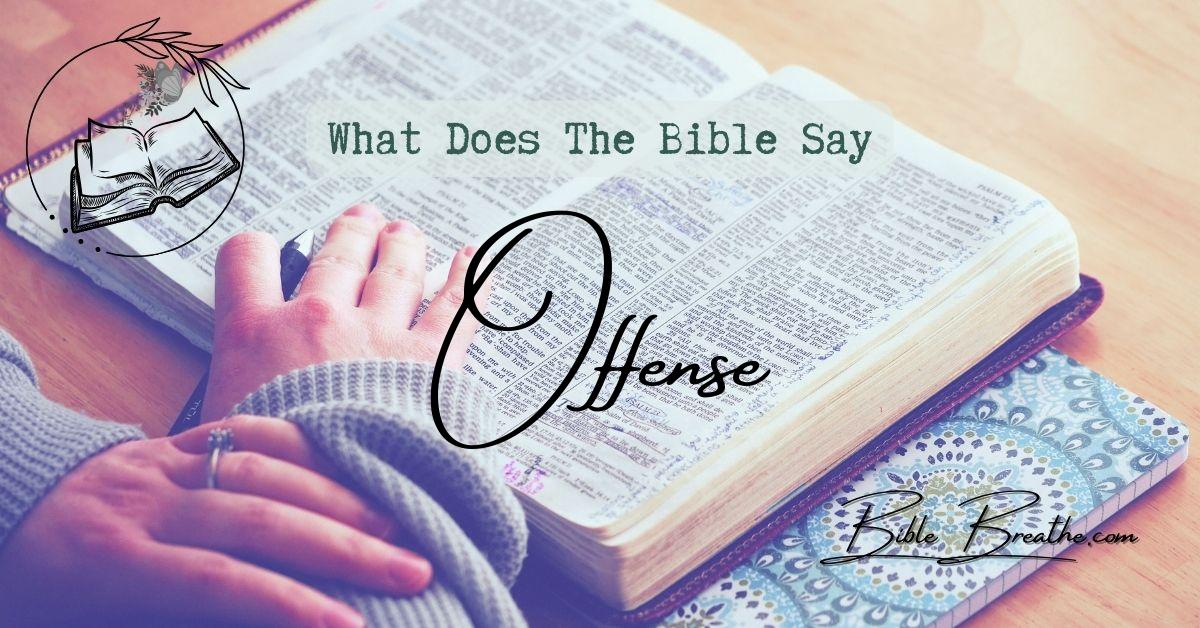Ever wondered what the Good Book has to say about getting offended?
Well, hold on to your hats because we’re about to dive into some biblical truth that’s juicier than your grandma’s secret pie recipe!
In the Bible, offense isn’t just about bruised egos; it’s like this massive iceberg of spiritual stuff lurking beneath the surface.
It’s about forgiveness, righteous anger, and love that flows deeper than the Grand Canyon.
We’re talking about loving your neighbor, battling jealousy, and ditching selfish ambitions.
It’s a showdown against vengeance, grudges, and strife.
Now, picture this: we’re on an epic quest, not for buried treasure, but for a peace that transcends understanding.
It’s all about reconciliation, grace, and redemption, my friend.
So, are you ready to unlock the mysteries of offense and find the keys to living a life that’s truly free?
Buckle up; we’re in for a wild ride!
🚀✨
Key Takeaways
-
The Bible emphasizes the importance of forgiveness and advises overlooking offenses. Christians are encouraged to be understanding and compassionate towards others, demonstrating forgiveness and grace as a reflection of God’s love for humanity.
-
Holding onto offense can lead to spiritual and relational turmoil. It can breed bitterness, resentment, and hinder spiritual growth. Letting go of offense is not only beneficial for one’s mental and emotional well-being but also for maintaining healthy relationships and a close connection with God.
-
Christians are called to love and forgive as Christ did. Jesus exemplified forgiveness and love, even in the face of betrayal and cruelty. Believers are encouraged to follow this example, forgiving others as they have been forgiven by God, and seeking reconciliation and restoration in relationships.
-
The Bible teaches that forgiveness and love have the power to heal and restore. By extending forgiveness, individuals can experience freedom from the burden of offense, fostering a peaceful and loving environment conducive to spiritual growth and harmony.
-
In summary, the Bible stresses forgiveness, discourages holding onto offense, and calls believers to love and forgive as Christ did. Embracing forgiveness and love contributes to spiritual well-being, fosters healthy relationships, and reflects the teachings of Christ.
Navigating Offense in the Bible
Photo modified by BibleBreathe.com. Original photo by Keira Burton on Pexels
Offense, my friends, it’s like an ember that can set your soul ablaze.
It’s a common thread in our human interactions, capable of sparking fiery emotions and straining even the closest relationships.
But don’t worry; the Bible has something to say about it.
Proverbs 19:11: The Wisdom of Letting It Slide
In the book of Proverbs, we stumble upon a nugget of pure wisdom:
“Good sense makes one slow to anger, and it is his glory to overlook an offense.” – Proverbs 19:11 (KJV).
This verse, right here, it shines a light on the value of patience and understanding.
Sometimes, choosing not to take offense, well, that’s a sign of true wisdom.
Proverbs 18:19: The Fallout of Offending a Brother
Now, Proverbs, it goes even deeper, exploring the consequences of causing offense within a community:
“A brother offended is harder to be won than a strong city: and their contentions are like the bars of a castle.” – Proverbs 18:19 (KJV).
Picture this: reconciling with an offended brother is as tough as breaching the defenses of a fortified city.
That’s how serious offense can be.
James 3:16: Offense and Its Unwelcome Companions
The book of James adds another layer, connecting offense to some not-so-pretty human flaws:
“For where envying and strife is, there is confusion and every evil work.” – James 3:16 (KJV).
You see, offense often stems from jealousy and selfish ambition.
It’s like they’re all part of the same dysfunctional family.
To truly address offense, we must deal with these root causes.
Leviticus 19:18: Love and the Offense Antidote
Now, let’s turn to Leviticus, one of the foundation stones of the Bible, where the spotlight shines on love:
“Thou shalt not avenge, nor bear any grudge against the children of thy people, but thou shalt love thy neighbour as thyself: I am the LORD.” – Leviticus 19:18 (KJV).
It’s crystal clear here: love your neighbors, and don’t hold grudges.
This verse encourages us to create a culture of understanding and forgiveness.
1 Peter 2:23: Responding to the Sting of Revilement
Lastly, in the New Testament, 1 Peter sheds light on how we should respond to offense and suffering:
“Who, when he was reviled, reviled not again; when he suffered, he threatened not; but committed himself to him that judgeth righteously.” – 1 Peter 2:23 (KJV).
This verse paints a profound picture of enduring offense without striking back.
It points us toward a higher path, one of patience and trust in divine judgment.
As we journey through these scriptures and the related themes, we’re navigating the tricky terrain of offense, seeking wisdom and understanding to nurture peace, patience, and love in our everyday interactions.
Remember, sometimes it’s wiser to let it slide and choose the path of love and forgiveness.
Grasping Offense in Biblical Terms
Photo modified by BibleBreathe.com. Original photo by Alex Green on Pexels
Offense, my friends, is like a prickly bramble in the garden of our feelings.
It pops up where you least expect it, and if you’re not careful, it can turn into a raging wildfire.
In the Bible, offense is a topic that holds some deep insights, urging us to dive into its nature and the pitfalls it can create.
Telling Righteous Indignation from Harmful Offense
Now, let’s talk about anger in the Scriptures.
It’s not a stranger there.
Even Jesus, the embodiment of love and compassion, felt some righteous anger when He witnessed the desecration of God’s temple.
That’s the kind of anger that arises in the face of injustice or sin.
On the flip side, offense comes from personal hurt or displeasure, often blown way out of proportion.
It’s like mistaking a pebble for a boulder; your perception magnifies the impact.
“Be ye angry, and sin not: let not the sun go down upon your wrath.” – Ephesians 4:26 (KJV)
It’s crucial to draw the line between righteous anger and sinful offense.
Righteous anger seeks justice and correction, but offense clings to grievances, festering like an infected wound.
The Pitfalls of Holding onto Offense
Think of offense as a chain; it ties us to the one who caused the offense.
It’s like a self-imposed prison, and guess who the jailer is?
It’s our own grudge-bearing heart.
The dangers here are many – it cultivates bitterness, clouds our judgment, and blocks our ability to forgive and love unconditionally.
For if ye forgive men their trespasses, your heavenly Father will also forgive you.” – Matthew 6:14 (KJV)
Offense blinds us to the beauty of forgiveness and love, keeping us tethered to past hurts.
It’s like turning down a refreshing rain after a long drought and choosing to stay parched.
In closing, the Bible encourages us to embrace righteous anger when necessary but warns against the chains of offense.
So, let’s learn to tell the difference, forgive generously, and let love be our guiding light.
“And above all things have fervent charity among yourselves: for charity shall cover the multitude of sins.” – 1 Peter 4:8 (KJV)
Embracing Forgiveness: Unveiling Its Biblical Beauty
Photo modified by BibleBreathe.com. Original photo by Ono Kosuki on Pexels
In the rich tapestry of human interactions, forgiveness isn’t just a thread; it’s a radiant strand that weaves together our hearts with divine grace.
Colossians 3:13: The Gift of Forgiveness
Now, in the book of Colossians, we come across a profound exhortation:
“Forbearing one another, and forgiving one another, if any man have a quarrel against any: even as Christ forgave you, so also do ye.” – Colossians 3:13 (KJV).
This scripture, my friends, it paints a vivid picture of the significance of forgiveness in our Christian journey.
It’s like a mirror reflecting our forgiveness of others and the way Christ forgave us.
Ephesians 4:32: The Blueprint of Kindness and Forgiveness
Ephesians, oh, it echoes the same sentiment, emphasizing kindness and forgiveness as traits to imitate:
“And be ye kind one to another, tenderhearted, forgiving one another, even as God for Christ’s sake hath forgiven you.” – Ephesians 4:32 (KJV).
This verse shines a spotlight on the divine pattern of forgiveness and kindness, urging us to mirror it in our own lives.
In a world where hurt and resentment often mark the landscape, the call to forgiveness stands tall as a beacon of hope.
It gently nudges us to liberate our hearts from the heavy shackles of grudges and bitterness.
It’s like opening the curtains to let in the light of compassion and understanding, even in the darkest corners of our souls.
As we dive deep into the waters of forgiveness, we discover its transformative power, ushering in reconciliation, grace, and peace.
Through forgiveness, we become living reflections of the divine mercy that’s been poured upon us.
It’s like throwing a stone into a calm pond, creating ripples of love and harmony in a world that’s thirsting for understanding and compassion.
Navigating the Offense Minefield: Biblical Insights to Keep Your Faith on Track
Photo modified by BibleBreathe.com. Original photo by Keira Burton on Pexels
Offense, my friends, is like a hidden trap waiting to trip us up on our journey of faith.
The Bible gives us some wise counsel on how to navigate this tricky terrain and avoid causing offense to our fellow travelers.
Being Mindful of Others: 1 Corinthians 10:32
In this diverse tapestry of humanity, we encounter folks with all sorts of beliefs, backgrounds, and sensitivities.
The Bible, in 1 Corinthians 10:32, advises us to tread carefully, not giving offense needlessly.
Give none offence, neither to the Jews, nor to the Gentiles, nor to the church of God.” – 1 Corinthians 10:32 (KJV)
It’s like walking through a beautiful garden together, being careful not to step on the fragile flowers.
Responsible Freedom: Galatians 5:13
Freedom is a precious gift, but as they say, “With great power comes great responsibility.”
Galatians 5:13 reminds us to use our freedom wisely, especially in situations where offense could easily rear its head.
“For, brethren, ye have been called unto liberty; only use not liberty for an occasion to the flesh, but by love serve one another.” – Galatians 5:13 (KJV)
It’s akin to having a powerful tool in your hands; how you wield it can either build or break.
In a nutshell, the Bible encourages us to tread this intricate path of life with compassion and responsible actions.
Let’s make an effort to be considerate of others, honoring their unique journeys, and let’s use our freedom to spread love and build bridges instead of lighting fires of offense.
“Let your speech be alway with grace, seasoned with salt, that ye may know how ye ought to answer every man.” – Colossians 4:6 (KJV)
Frequently Asked Questions (FAQs) About What Does The Bible Say About Offense
What does the Bible say about forgiving offenses?
The Bible teaches forgiveness as a fundamental principle, exemplified in the Lord’s Prayer (Matthew 6:14-15).
Forgiving offenses is essential for one’s own spiritual well-being and reflects God’s forgiveness towards us.
How should Christians react when offended?
Christians should react to offense with forgiveness and love, following Jesus’ example.
Matthew 18:21-22 emphasizes the importance of forgiving others.
It’s an opportunity to extend grace, promote reconciliation, and remember God’s forgiveness towards us.
Responding with patience and understanding can help heal wounds and maintain unity.
Why is it important to overlook an offense?
Overlooking an offense aligns with biblical teachings on forgiveness and grace.
Proverbs 19:11 advocates for a person’s discretion to overlook an offense, fostering harmony and maintaining relationships.
Forgiveness exemplifies Christ’s teachings and encourages a compassionate and understanding approach.





